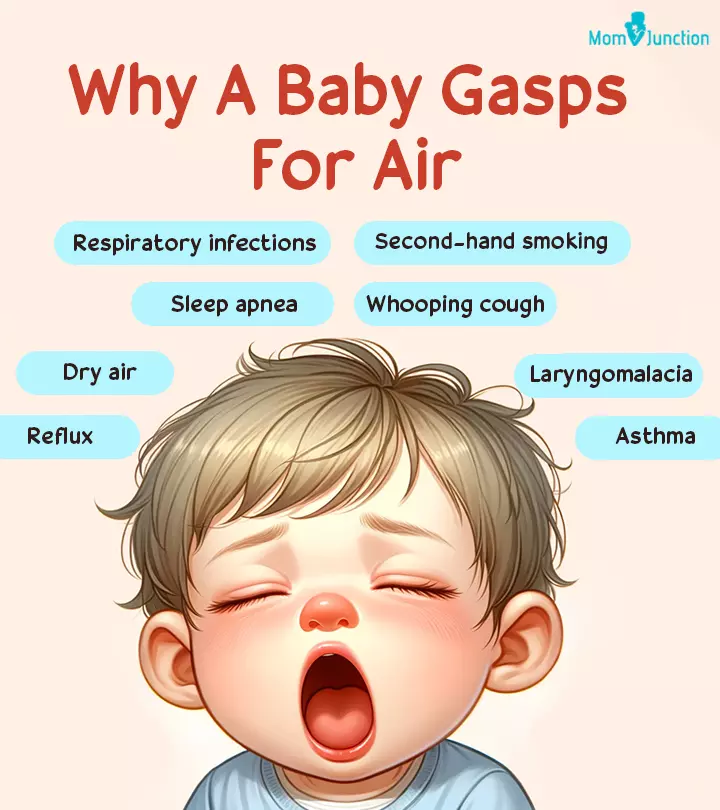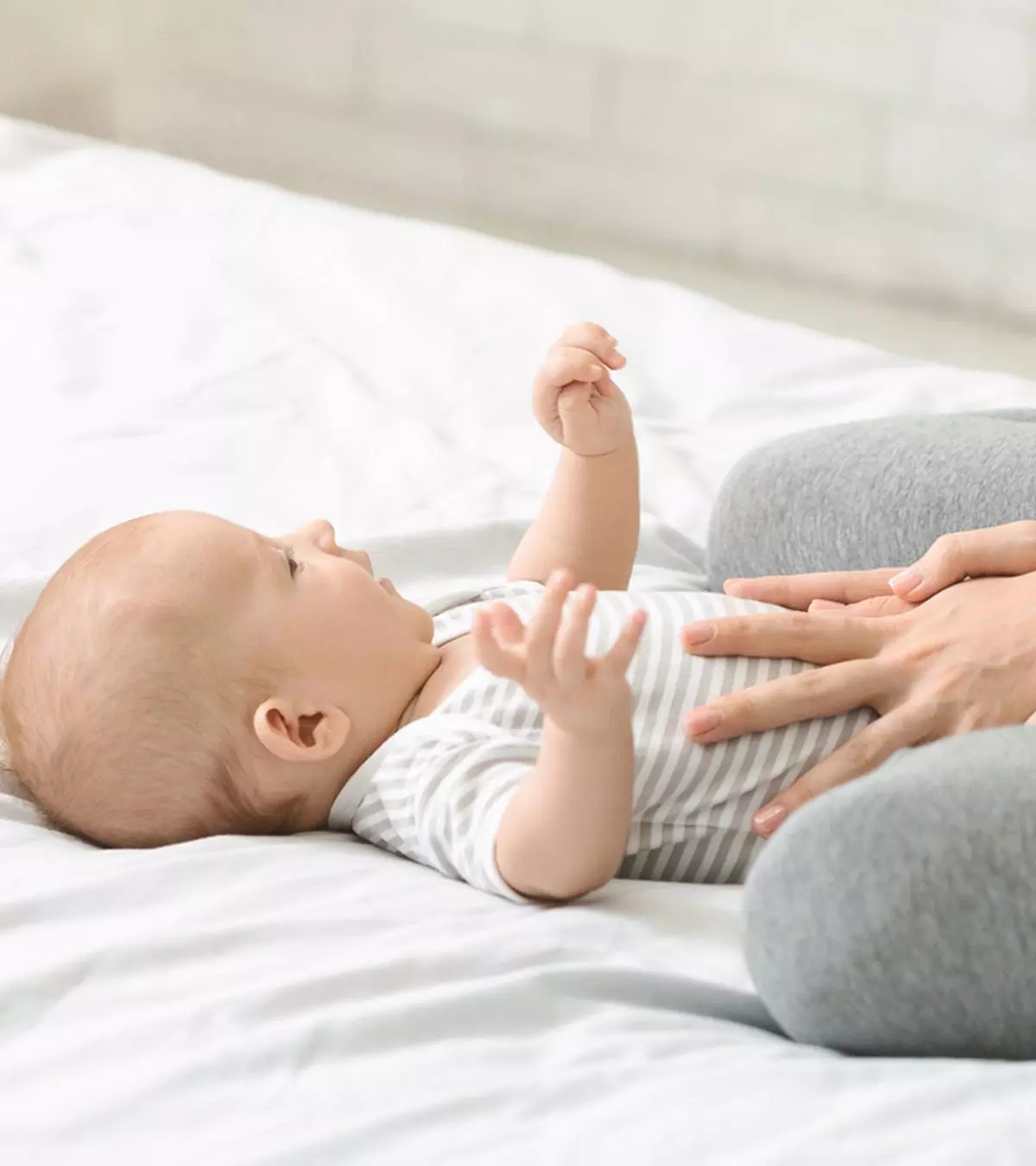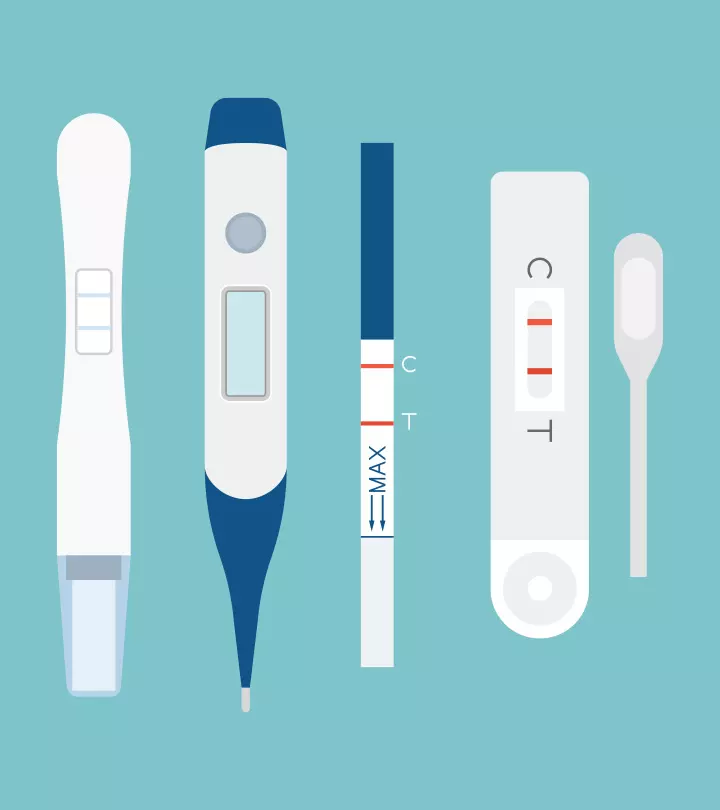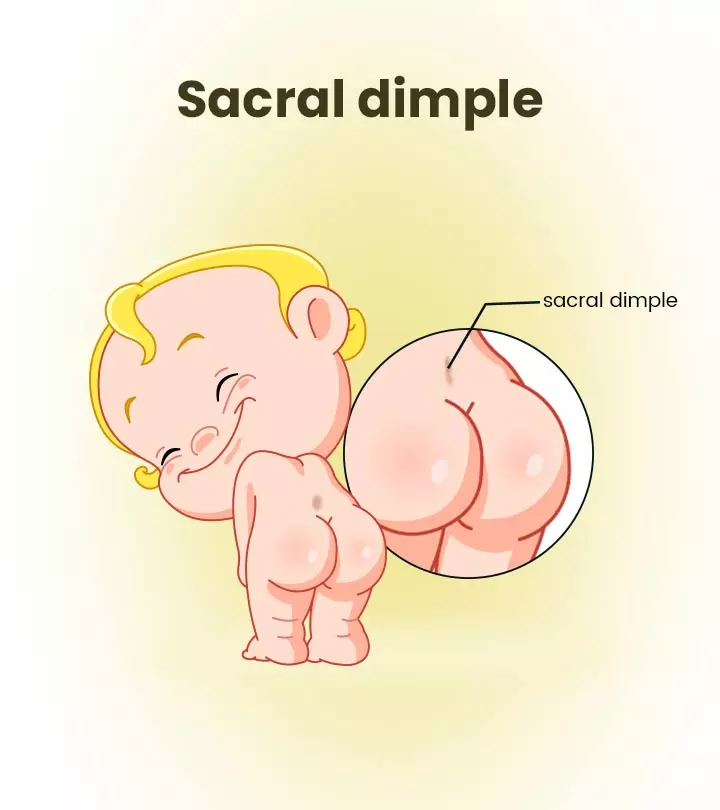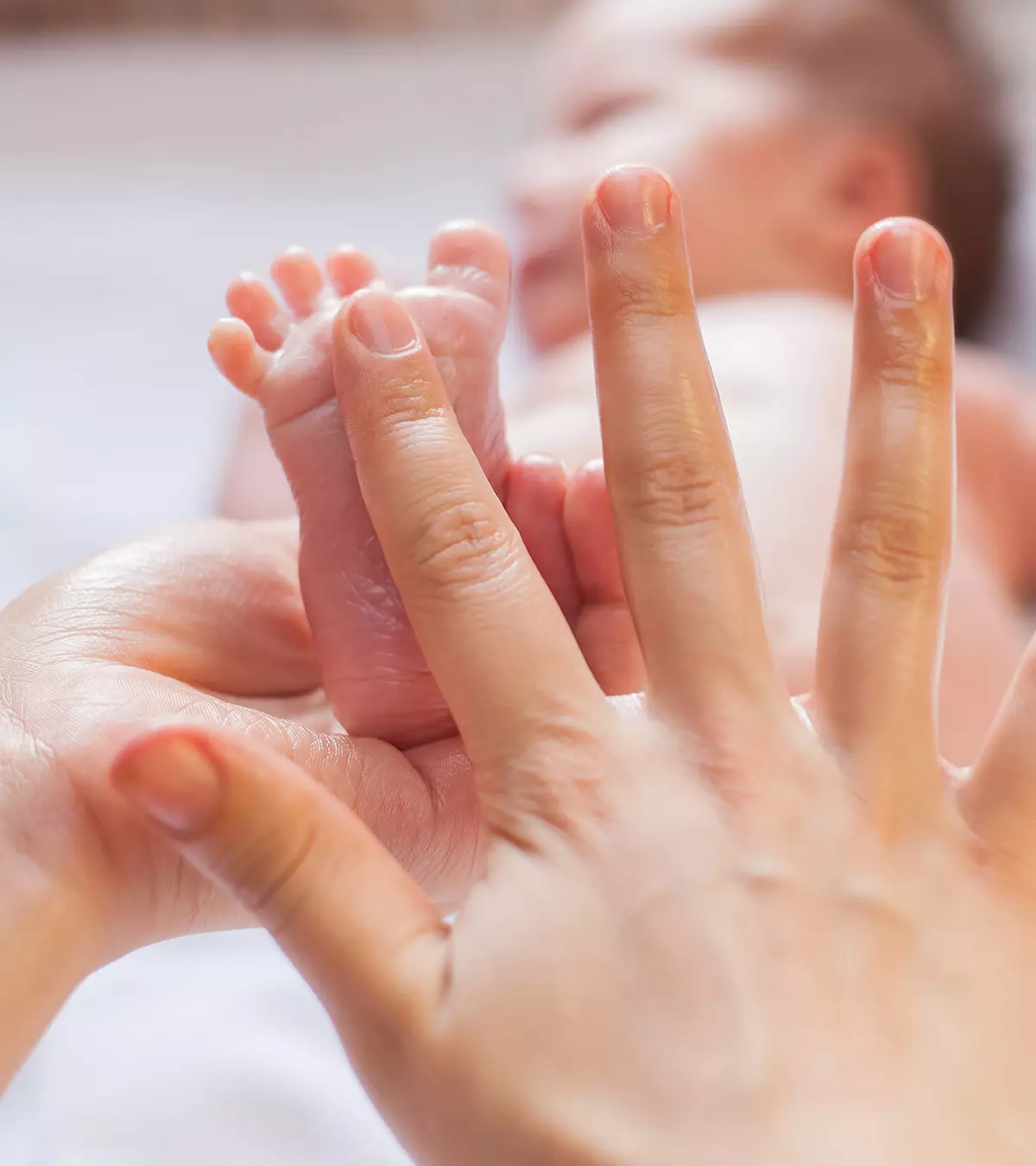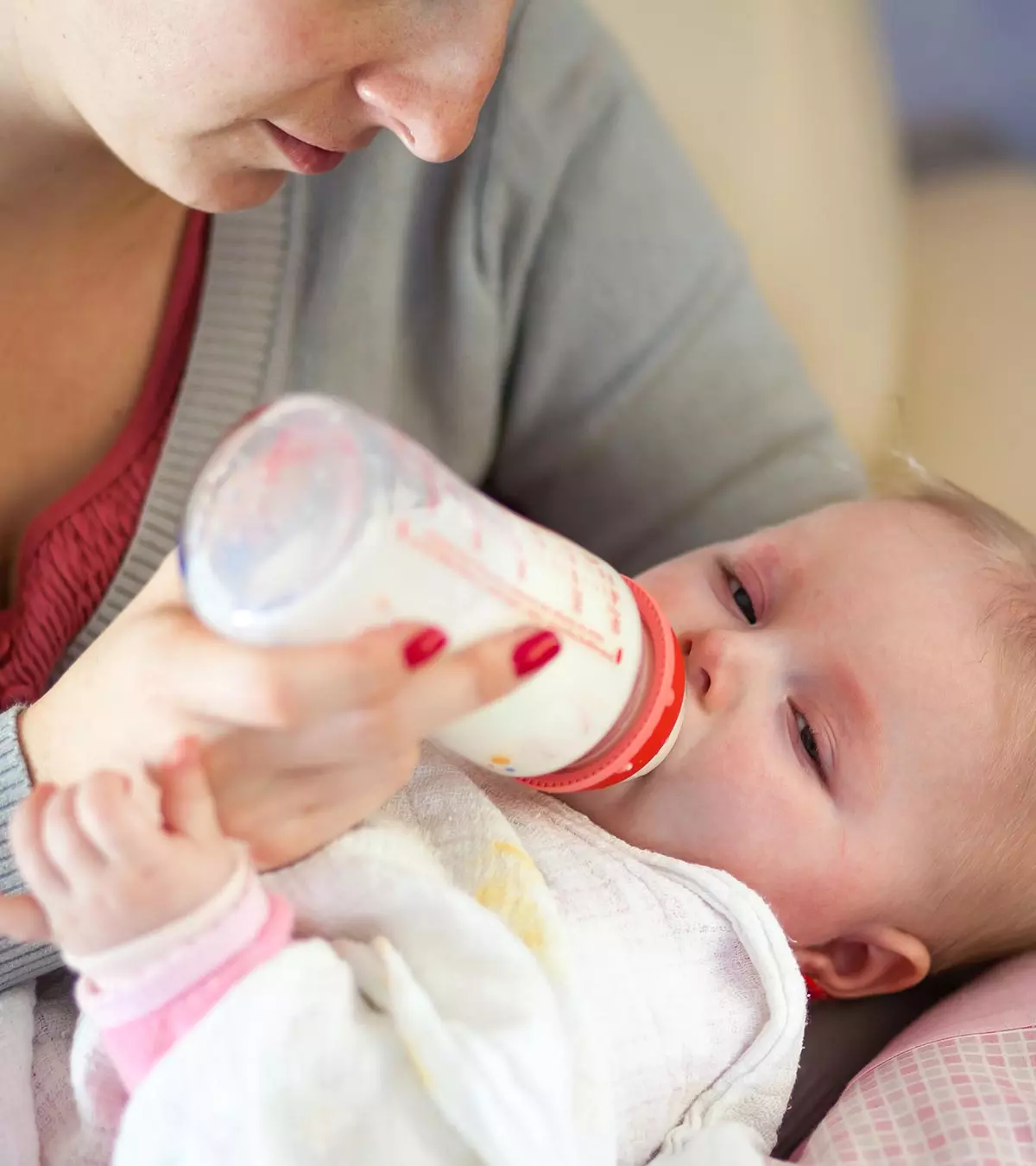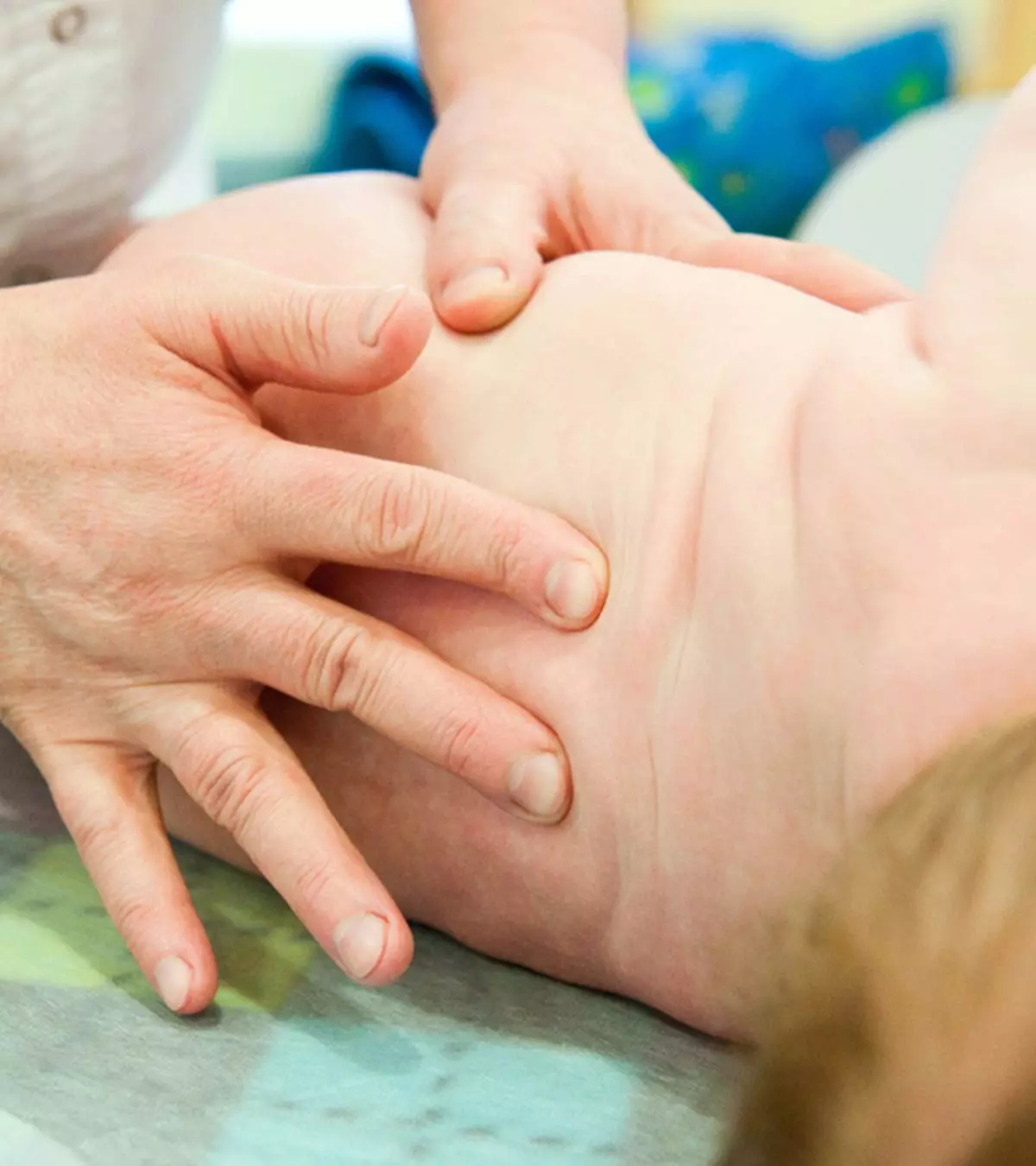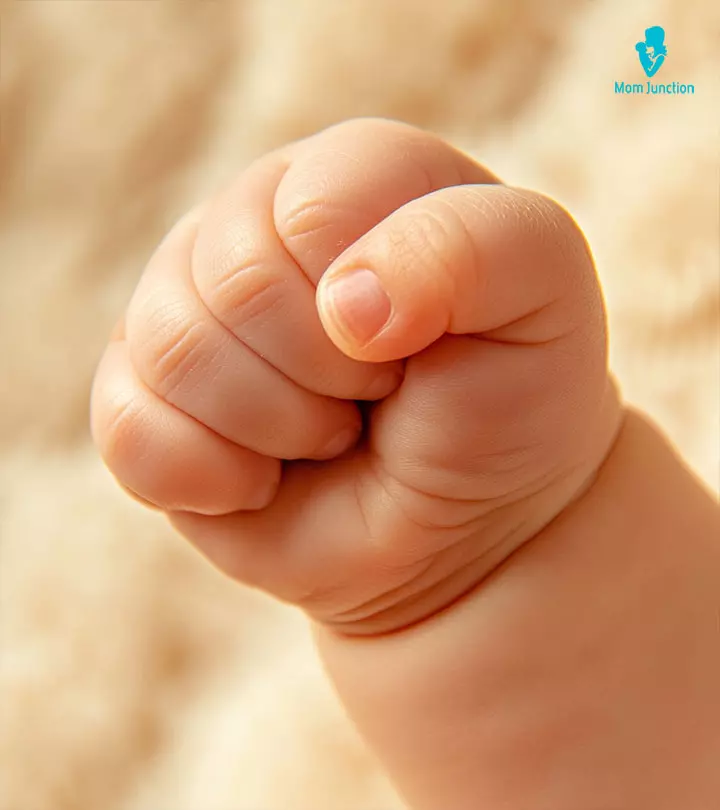
Image: Midjourney/ MomJunction Design Team
It may be troubling to see your baby’s clenched fists practically all the time, even though you want them to hold on to toys or your fingers.
Usually, babies under six months keep their fists clenched most of the time. However, if a baby aged more than six months does so, it might be a cause for concern and necessitate medical care.
Read on to know more about the causes of clenched fists in infants, when you can expect your baby to unclench their fists to hold other objects, and why some newborns don’t clench their fists.
Key Pointers
- The palmar grasp reflex causes the fetuses and babies under six months to keep their fists clenched most of the time.
- Unclenching of fists indicates proper neuromotor development enabling babies to hold and grasp objects.
- The persistence of a baby’s clenched fists beyond six months could indicate an underlying neurological issue. Talk to your pediatrician if your baby keeps its fists clenched or doesn’t try to grasp objects or items even after six months.
Why Do Babies Clench Their Fists?
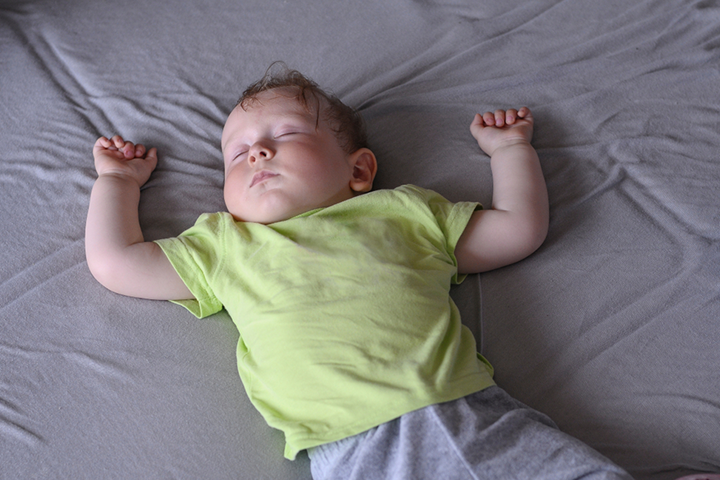
The palmar grasp reflexiAn involuntary reflex that causes babies to fold their fingers around an object upon pressure or touch. is the reason behind clenched fists in fetuses and babies younger than six months. This primitive reflex is a normal part of a baby’s development and disappears after the age of six months as the baby’s brain matures. You can visualize this when you stroke the back of your little one’s palm and they immediately try to grip your finger with their small fingers. Once you try to let go of the hand, they will slowly release that tight grip (1).
Anecdotal evidence states that a baby’s clenched fists indicate stress or hunger in babies. However, this is a normal reflex that may have been required for survival in the evolutionary past. You may look for other signs to understand stress or hunger in babies.
 Quick fact
Quick factWhy Do Babies Clench Fists While Feeding?
It is not just while feeding, but while sleeping, playing, or any other time that an infant under six months of age may clench their fists due to the primitive grasp reflex.
A baby’s clenched fists are normal until six months of age, and it may not be a useful method to understand your baby’s hunger. You may look for other feeding cues, including (3):
- Lip licking
- Keeping hands in the mouth

- Arm and leg movements
- Sucking sounds
- Looking towards you
- Crying
What Are Some Other Reasons For Baby Clenched Fists?
Apart from being part of a typical developmental process, persistent clenched fists of babies may be due to the following reasons.
- Muscle tone distribution: During their early months of life, babies have weaker control over their chest, torso, head, and abdomen compared to their arms and legs. Therefore, even if your baby is relaxed and calm, if their body is moved quickly, such as when swinging or while picking them up, they might clench their fists to manage muscle tension and coordinate their body movements (4).
According to Dorota Lewandowska, a nurse in the Department of Neonatology and Neonatal Intensive Care, Institute of Mother and Child in Poland, “If the baby clenches its fists, for example when lifting it, pay attention to whether we provide it with a sufficiently stable base. Also, when the baby is lying in the crib or on the mat and clenches his fists tightly, he probably does it on the basis of the so-called compensation – it “compensates” for the reduced abdominal tension and uses taut hands to stabilize the body” (4). - Colic: Baby clenched fists could be a sign of colic in babies, a condition where a healthy baby may cry excessively for no apparent reason (5).
- Pain and discomfort: If a baby is ill, they may lose muscle tension and their bodies may become weak and floppy. Your baby may clench their fist to tense up their muscles when experiencing pain (6).
- Spastic cerebral palsy: It is a neurological disorder that may cause the persistence of the grasping reflex in babies or baby clenched fists beyond the age of six months. It possibly occurs due to an infection or brain injury and causes loss of brain motor function. Brain damage may indicate shaken baby syndromei. Your child may have additional symptoms, including seizures, respiratory problems, and vision, speech, or hearing problems (2) (7).
When To Seek Medical Advice?
A baby clenching their fists is usually not a medical concern requiring medical attention. However, seek medical care if your baby’s clenched fists are accompanied by other factors, including:
- Clenching fists beyond six months
- Seizures
- Excessive crying
- Fever
- Difficulty sleeping
- Developmental delays
- Gastrointestinal problems
In such cases, consult a pediatrician for necessary evaluation. Early identification and interventions could improve your baby’s quality of life and prevent severe dysfunctions (2).
Why Do Some Babies Not Clench Their Fists?
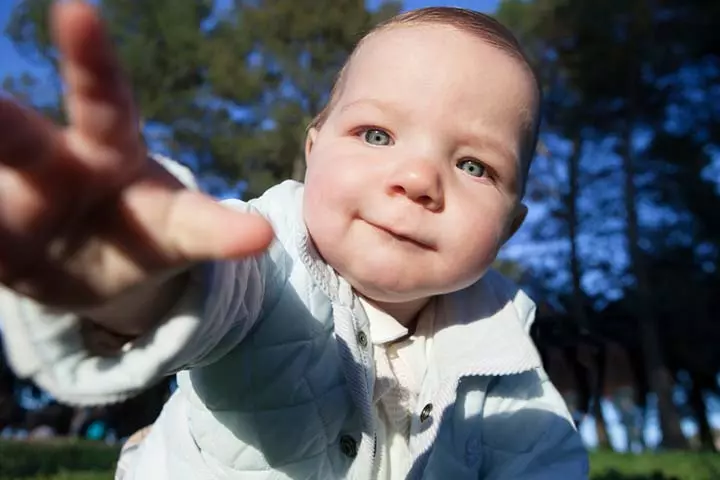
Clenched fists in babies are seen from the fetal stage to six months after birth. The palmar grasp reflex usually appears from the 16th week of gestation.
The following reasons may cause babies not to clench their fists.
- Amniotic band syndrome: Absence of clenched fists in fetal life may indicate amniotic band syndrome. This is a rare condition where strands or bands of amniotic sac wrap the fetus’ fingers, toes, or any other part of the body. The severity of amniotic band syndrome depends on the affected location and the tightness of the wrap. Milder wraps can be surgically removed after birth without causing any physical damage. However, tighter wraps may permanently damage the fingers (8).
- Peripheral nerveiA network of nerves that lie outside the brain and spinal cord. injuries: Weak palmar grasp reflex or unclenched fists before the age of six months could occur due to injuries of the peripheral nerve roots, plexusiA branching bundle of interlacing nerves and vessels. , and spinal cord (2). Babies who have peripheral nerve damage due to complications in labor may develop unclenched fists.
 Point to consider
Point to consider- Floppy babies: In this condition, the baby’s muscle tone is lost due to congenital reasons. The baby feels limp like a rag doll when carried in your arms.
Appropriate prenatal care and cesarean sections may help reduce the risk of peripheral neuropathyiCondition where the peripheral nerves are damaged. . You may discuss with your obstetrician to choose the right method of delivery to avoid birth injuries.
When Should Babies Unclench Their Fists?
The baby will gradually begin grasping, holding, and releasing objects with their tiny fingers as the reflex fades. Babies do this on their own as their little brain matures. Unclenching of fists indicates a maturation of higher motor centers of the brain and development of voluntary motor functions (9) (2).
If your baby doesn’t unclench their fist even momentarily, you should approach your pediatrician. Persistent fist clenching without even a transient opening may point to some serious conditions like spasticityi, atypical glycine encephalopathy, Galloway-Mowat syndrome 1, heart and brain malformation syndrome (HBMS), and other disorders (10).
Frequently Asked Questions
1. Do closed fists always mean the baby is hungry?
No, if your baby has a clenched fist, it does not necessarily mean that they are hungry. It might just be a developmental reflex. However, to be sure, you may check for other baby body cues and their meaning to know if your baby is clenching their fist because of hunger or otherwise.
2. When should I be worried about clenched fists?
If your baby has their fists clenched all the time tightly and does not unclench them easily, it might indicate an underlying neurological problem. However, it is advised to consult with the doctor regarding the same for a confirmed diagnosis.
3. Why do babies clench their fists when sleeping?
Babies usually clench their fists while sleeping as a result of the primitive grasp reflex and not due to any developmental disorder.
4. What is clenched fist syndrome?
Clenched fist syndrome is when a person keeps one or both hands tightly clenched. It can be seen in various age groups. This is considered a psychological disorder since there won’t be any somatic pathologiesiA psychiatric condition that makes a person overly anxious about their physical symptoms. causing the condition. However, it can be associated with swelling and stiffness. These symptoms can be due to continuous clenching of the hands. Doctors may look for all possible causes of a baby’s clenched fists and evaluate your baby’s mental health to establish the diagnosis (11).
5. How can parents help their babies relax their clenched fists?
A baby’s clenched fists generally do not require unclenching. Nevertheless, parents may gently massage their palms or give them toys that require the opening and closing of their palms (12). You may also tend to their needs if you think they are clenching their fists because they are hungry, need attention, or are uncomfortable.
Often, babies open up their fists a little later than expected. You need not worry as it is normal. Going through developmental milestones later than others is not something that should bother you, as it takes time for some babies to cope with the changes they notice within themselves. If your baby’s clenched fists remain the same beyond six months of age, you should consult the baby’s pediatrician. It may indicate an issue that needs to be given immediate attention and starting treatment as early as possible can be beneficial.
Infographic: Underlying Causes Of Fist Clenching In Babies
Although fist clenching in babies is generally a typical behavior that is expected to go away after a few months, there may also be underlying conditions causing them to clench their fists. So give this infographic a read to learn about these conditions and seek timely medical help.
Some thing wrong with infographic shortcode. please verify shortcode syntax
Illustration: Why Do Babies Clench Their Fists & When Do They Unclench?

Image: Stable Diffusion/MomJunction Design Team
References
1. Newborn Reflexes; American Academy of Pediatrics
2. Aabha A. Anekar and Bruno Bordoni; Palmar Grasp Reflex;StatPearls Publishing (2025)
3. Caring for Your Baby; Health Information Translations
4. Clenched fists in an infant; Institute of Mother and Child
5. Colic in babies: Tips for soothing your child from a pediatrician; CHOC
6. Pain In Infants (Babies); Children’s Minnesota
7. Cerebral Palsy in Children; Stanford Medicine Children’s Health
8. Amniotic Band Syndrome; UCSF Benioff Children’s Hospital
9. Newborn Reflexes; Stanford Children’s Health
10. Hand clenching; National Library of Medicine
11. The clenched fist syndrome: case report of a clinical rarity of special interest for psychiatrists and hand surgeons; BMC Psychiatry
12. Simple Tricks for Tiny Fisted Hands; Virginia Commonwealth University
Community Experiences
Join the conversation and become a part of our nurturing community! Share your stories, experiences, and insights to connect with fellow parents.
Read full bio of Dr. Neema Shrestha
Read full bio of Dr Bisny T. Joseph
Read full bio of Rohit Garoo
Read full bio of Shinta Liz Sunny









